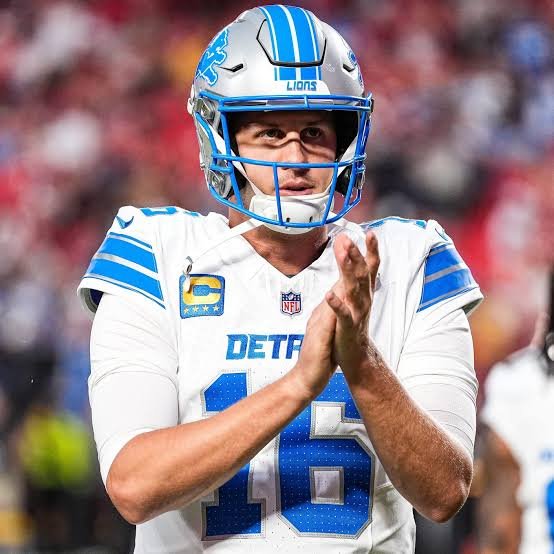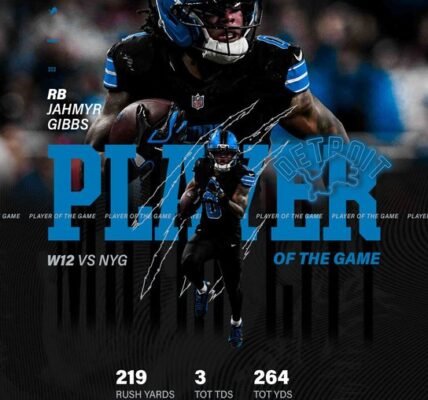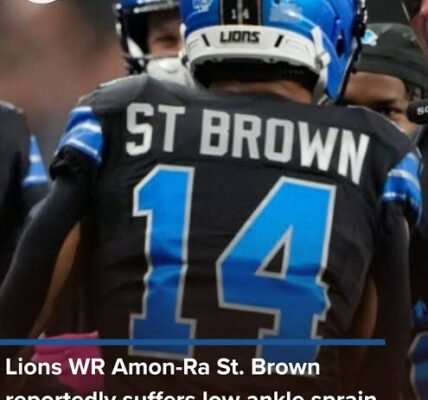The Detroit Lions’ opening drive against the Kansas City Chiefs on Sunday Night Football started perfectly. But one confusing call that nullified a touchdown marked the beginning of what would soon turn into a nightmare evening for Detroit.
The Lions marched efficiently down to Kansas City’s goal line, mixing powerful runs with sharp passes from quarterback Jared Goff. On fourth and goal, the Lions went for it, as they often do. This time, they unveiled a trick play. Goff shifted into motion, and the ball was directly snapped to running back David Montgomery, who tossed it to Goff. After briefly bobbling the pass, Goff secured it and crossed into the end zone.
It wasn’t quite as clean as his touchdown catch versus the Seahawks last season during his flawless 18-for-18 performance, but it was still an impressive play. Unfortunately, “style points” don’t count in officiating. After a lengthy conference, referees ruled Goff’s pre-snap motion illegal. As a result, he was flagged, and the touchdown was wiped away. Detroit then settled for a field goal instead.
The penalty ignited confusion and renewed claims among fans and analysts of referee bias favoring the Chiefs, who finished with zero accepted penalties. That same confusion spread to both Goff and head coach Dan Campbell after the game.
Goff Thought the Play Was Legal
No one seemed more surprised than Goff himself when the touchdown was called back. Speaking to reporters afterward, the quarterback sounded bewildered:
“Yeah, I guess we all need to research what exactly went wrong. My hands weren’t under center, and I was set to start the play. From my understanding, that’s all that mattered. But (the officials) said that because of how close I was to the center, it automatically made me the quarterback, and I can’t go in motion. I’d never heard that before. Our coaches hadn’t either. If that’s truly the rule, we’ll need to look deeper into it.”
Some might argue Goff’s light tap on center Graham Glasgow before motion made him technically “under center,” or that he didn’t set long enough before the snap. But both interpretations sit in a gray area, raising questions about whether the penalty was warranted—especially after such a long delay and discussion.
Campbell and the Pool Report Offer Conflicting Explanations
Goff said officials told him the issue stemmed from how close he lined up to the center. Dan Campbell, meanwhile, was given a completely different reason. After the game, he told reporters:
“I know the call came from New York, and they said (Goff) never stopped. He stayed in motion. He can’t do that.”
“New York” refers to the replay command center at the NFL’s Art McNally GameDay Central. That’s a key detail—because it means Goff and Campbell heard conflicting things: one about Goff’s position, the other about his movement. Both could technically be true, but the mixed messaging created even more confusion.
Typically, the postgame pool report clears up such disputes, but this one added more uncertainty. Referee Craig Wrolstad told reporter Matt Derrick that the problem centered on whether Goff reset himself before the snap. Wrolstad explained:
“Because (Goff) went out of view for some of us, we had to piece together as a crew whether he stopped initially at center and whether he stopped again once he motioned out.”
He added that Goff stopped at the quarterback position but not as a receiver. When asked if the play would’ve been legal had Goff paused before the snap, Wrolstad confirmed, “That’s correct.” He also noted that Goff would’ve been fine running the play from shotgun formation.
The most curious part came when Wrolstad clarified that the decision came entirely from on-field officials: “We did not have any assistance from Kansas City or New York.” That directly contradicted Campbell’s statement suggesting the league office had weighed in.
Since Wrolstad admitted they had to “piece” the sequence together, replay input might have been involved. That raises questions about whether such help is permitted—or if it was part of the automatic review of scoring plays. If it was the latter, they could justify the penalty. If not, Lions fans may have reason to feel slighted. Alternatively, Campbell may have simply misunderstood communication from officials in real time.
Ultimately, Campbell said the overturned play didn’t decide the game. Still, it’s hard to deny that momentum swung after Goff’s touchdown was erased. Combined with several other questionable calls and missed penalties, that moment likely rattled the Lions’ focus—leading to costly mistakes that sealed their 30–17 loss.




